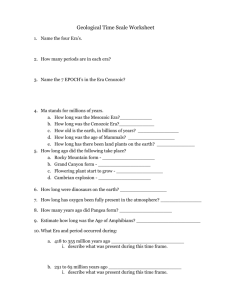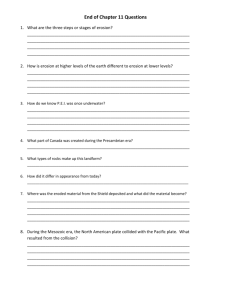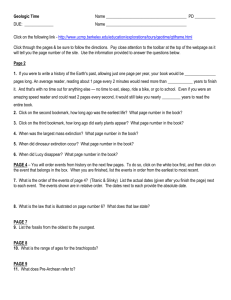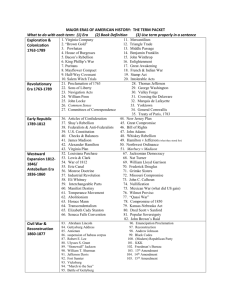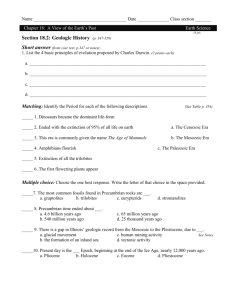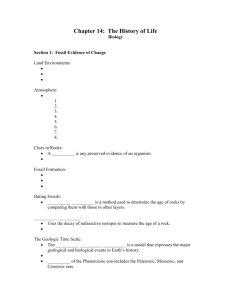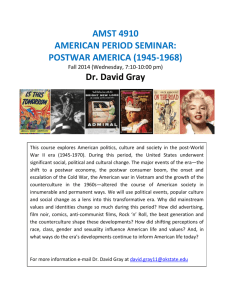DeWolf Research Statement 5
advertisement
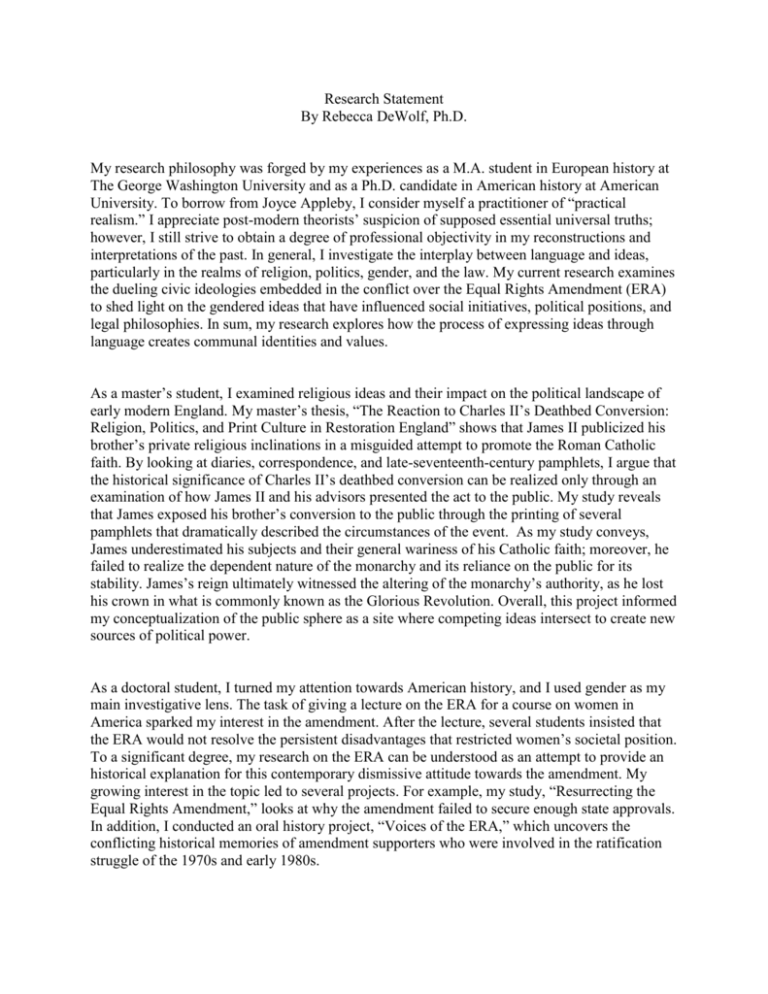
Research Statement By Rebecca DeWolf, Ph.D. My research philosophy was forged by my experiences as a M.A. student in European history at The George Washington University and as a Ph.D. candidate in American history at American University. To borrow from Joyce Appleby, I consider myself a practitioner of “practical realism.” I appreciate post-modern theorists’ suspicion of supposed essential universal truths; however, I still strive to obtain a degree of professional objectivity in my reconstructions and interpretations of the past. In general, I investigate the interplay between language and ideas, particularly in the realms of religion, politics, gender, and the law. My current research examines the dueling civic ideologies embedded in the conflict over the Equal Rights Amendment (ERA) to shed light on the gendered ideas that have influenced social initiatives, political positions, and legal philosophies. In sum, my research explores how the process of expressing ideas through language creates communal identities and values. As a master’s student, I examined religious ideas and their impact on the political landscape of early modern England. My master’s thesis, “The Reaction to Charles II’s Deathbed Conversion: Religion, Politics, and Print Culture in Restoration England” shows that James II publicized his brother’s private religious inclinations in a misguided attempt to promote the Roman Catholic faith. By looking at diaries, correspondence, and late-seventeenth-century pamphlets, I argue that the historical significance of Charles II’s deathbed conversion can be realized only through an examination of how James II and his advisors presented the act to the public. My study reveals that James exposed his brother’s conversion to the public through the printing of several pamphlets that dramatically described the circumstances of the event. As my study conveys, James underestimated his subjects and their general wariness of his Catholic faith; moreover, he failed to realize the dependent nature of the monarchy and its reliance on the public for its stability. James’s reign ultimately witnessed the altering of the monarchy’s authority, as he lost his crown in what is commonly known as the Glorious Revolution. Overall, this project informed my conceptualization of the public sphere as a site where competing ideas intersect to create new sources of political power. As a doctoral student, I turned my attention towards American history, and I used gender as my main investigative lens. The task of giving a lecture on the ERA for a course on women in America sparked my interest in the amendment. After the lecture, several students insisted that the ERA would not resolve the persistent disadvantages that restricted women’s societal position. To a significant degree, my research on the ERA can be understood as an attempt to provide an historical explanation for this contemporary dismissive attitude towards the amendment. My growing interest in the topic led to several projects. For example, my study, “Resurrecting the Equal Rights Amendment,” looks at why the amendment failed to secure enough state approvals. In addition, I conducted an oral history project, “Voices of the ERA,” which uncovers the conflicting historical memories of amendment supporters who were involved in the ratification struggle of the 1970s and early 1980s. Rebecca DeWolf, Ph.D. Rdewolf416@gmail.com 2 My current research illuminates the ideological contours of the ERA conflict from 1920 to 1963. Through a careful analysis of correspondence, public and private utterances, congressional testimonies, and several court cases my dissertation unearths the competing civic ideologies rooted in the struggle: emancipationism and protectionism. Emancipationists supported the ERA as a fulfillment of America’s political aspirations. In contrast, protectionists opposed the ERA as a threat to sex-based legal distinctions. From the protectionist perspective, American society rightly affirmed the separate roles of men and women citizens by differentiation in law. As my study explains, emancipationists and protectionists held different interpretations of the relationship between gender and citizenship. Emancipationists insisted that American political ideals upheld the right of men and women to participate as citizens on the same terms while protectionists maintained that true sexual equity demanded that the law be free to treat citizens differently on account of sex. As well, my dissertation forcefully contends that the original ERA conflict established America’s gendered citizenship. The Nineteenth Amendment profoundly changed women’s relationship to the state, however disparities in men and women’s positions persist to this day, because protectionists modernized the justification for sex-based differential treatment. Put simply, protectionists constructed a new way of understanding American citizenship that upheld the equity of separate standards for men and women citizens. In the end, protectionists successfully refashioned full citizenship status to include sex-specific standards, yet their triumph also created dual meanings for American citizenship that negated the doctrine of universal rights and responsibilities. My dissertation provides a new understanding of the historical basis for the gap between men and women’s citizenship. Most scholars frame the original ERA conflict as a battle among women, about women, and only concerning women. Scholars predominantly reduce the conflict to a fight between two feminist ideologies over the trajectory of the women’s movement. In contrast, my study reveals that the original ERA conflict is best understood not mainly as a struggle between feminist ideologies, but rather as a conflict between competing civic ideologies. As my dissertation demonstrates, an array of men and women politicians, intellectuals, activists, and government officials participated in the conflict. Moreover, the participants not only argued over women’s constitutional status; they also contested the nature of American citizenship. My study also contributes to the growing scholarship on citizenship and gender. As several scholars make clear, ideas about gender are woven into national identities and expressed through the language of citizenship. My project enhances this analysis by emphasizing how the original ERA conflict reformulated American citizenship from a single, masculine paradigm to a dual-gender model that included separate standards for men and women citizens. Altogether, as my dissertation conveys, the original ERA conflict further demonstrates that gender is among the salient forces that shape the construction of national perspectives and the concept of citizenship. While I am currently revising my dissertation for publication as a book, I have considered additional projects to explore over the upcoming years. A logical extension of my dissertation Rebecca DeWolf, Ph.D. Rdewolf416@gmail.com work would be a study on the birth control movement and its effect on the conception of a citizen’s rights. As well, I would like to complete a study that examines the different conceptualizations of masculinity embedded in the political positions of Franklin D. Roosevelt, Henry Wallace, and Harry Truman. In sum, I continue to be intrigued by the relationship between language and ideas, and its impact on religion, politics, gender, and the law. 3

